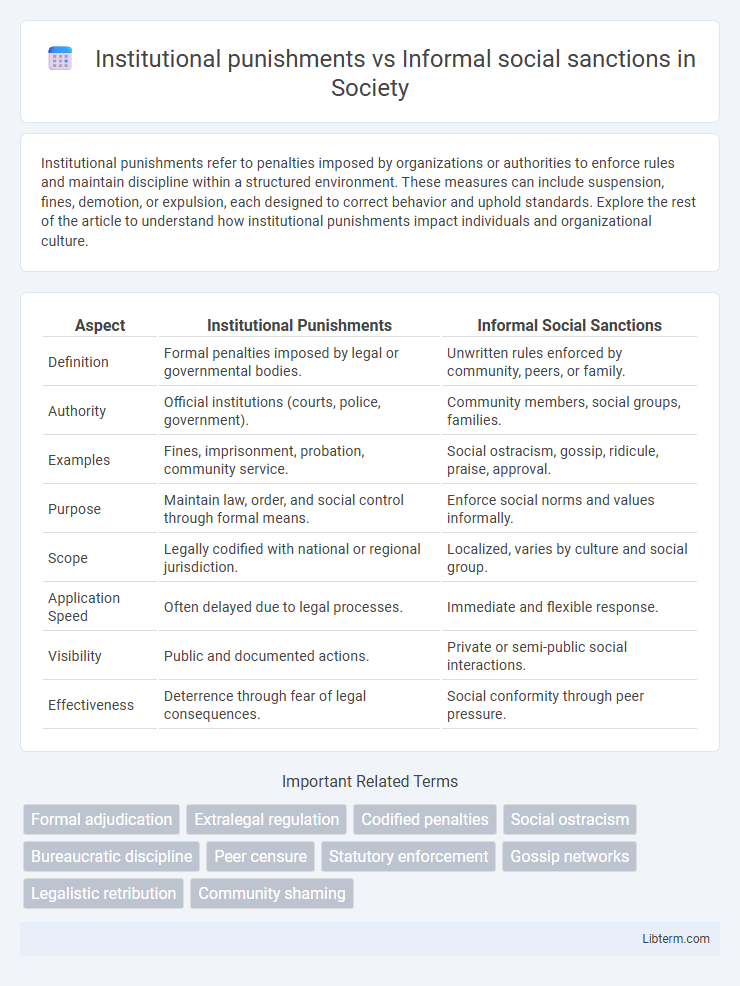Institutional punishments refer to penalties imposed by organizations or authorities to enforce rules and maintain discipline within a structured environment. These measures can include suspension, fines, demotion, or expulsion, each designed to correct behavior and uphold standards. Explore the rest of the article to understand how institutional punishments impact individuals and organizational culture.
Table of Comparison
| Aspect | Institutional Punishments | Informal Social Sanctions |
|---|---|---|
| Definition | Formal penalties imposed by legal or governmental bodies. | Unwritten rules enforced by community, peers, or family. |
| Authority | Official institutions (courts, police, government). | Community members, social groups, families. |
| Examples | Fines, imprisonment, probation, community service. | Social ostracism, gossip, ridicule, praise, approval. |
| Purpose | Maintain law, order, and social control through formal means. | Enforce social norms and values informally. |
| Scope | Legally codified with national or regional jurisdiction. | Localized, varies by culture and social group. |
| Application Speed | Often delayed due to legal processes. | Immediate and flexible response. |
| Visibility | Public and documented actions. | Private or semi-public social interactions. |
| Effectiveness | Deterrence through fear of legal consequences. | Social conformity through peer pressure. |
Defining Institutional Punishments
Institutional punishments refer to formally imposed penalties by authorized entities such as governments, courts, and law enforcement agencies to enforce laws and maintain social order. These sanctions include fines, imprisonment, probation, and community service, designed to deter criminal behavior and ensure compliance with legal standards. Institutional punishments are codified within legal systems and supported by official procedures and documentation.
Understanding Informal Social Sanctions
Informal social sanctions arise from everyday social interactions and community norms, guiding behavior through approval or disapproval without formal authority or legal enforcement. These sanctions include actions like gossip, ostracism, and praise, which effectively regulate conduct by leveraging social acceptance and group belonging. Understanding informal social sanctions reveals how societies maintain order and influence behavior through shared values and collective judgment, complementing institutional punishments.
Historical Evolution of Sanction Mechanisms
Institutional punishments have evolved from formalized legal codes, such as Hammurabi's Code and medieval justice systems, to complex modern judicial frameworks enforcing laws through courts and correctional facilities. Informal social sanctions trace back to early tribal societies where communal disapproval, shaming, and ostracism regulated behavior without codified laws. The historical evolution reveals a gradual shift from predominantly informal social controls to formal institutional punishments as societies increased in complexity and governance structures centralized.
Key Differences Between Institutional and Informal Approaches
Institutional punishments are formalized measures enforced by governmental or organizational authorities, including legal penalties, fines, and imprisonment, whereas informal social sanctions are community-driven responses such as social ostracism, verbal reprimands, or peer pressure. Institutional punishments rely on codified laws and official procedures to regulate behavior, while informal sanctions depend on social norms and collective agreement within groups to maintain order. The key differences lie in the source of authority, enforcement mechanisms, and the scope of influence, with institutions wielding legal power and informal sanctions leveraging social relationships.
Effectiveness of Formal Punishments
Formal punishments administered by institutions such as courts and law enforcement agencies demonstrate measurable effectiveness by deterring criminal behavior through predictable legal consequences and structured enforcement mechanisms. Empirical studies indicate that consistent application of formal sanctions reduces recidivism rates and enhances public safety by reinforcing societal norms within a legal framework. However, the effectiveness of institutional punishments depends on factors such as transparency, fairness, and the capacity of judicial systems to adapt to evolving social contexts.
Impact of Informal Sanctions on Behavior
Informal social sanctions such as peer pressure, gossip, and social exclusion significantly influence behavior by promoting conformity within a community without formal authority intervention. These sanctions operate through emotional and psychological mechanisms, encouraging individuals to adhere to social norms to maintain acceptance and avoid isolation. The immediacy and social context of informal sanctions often result in more consistent behavioral regulation compared to institutional punishments, which are typically delayed and impersonal.
Cultural Influences on Sanction Types
Cultural influences significantly shape the preference for institutional punishments or informal social sanctions within societies, reflecting underlying values and norms. Collectivist cultures tend to rely more on informal social sanctions, such as shame and social exclusion, to maintain social harmony, while individualistic cultures often emphasize formal institutional punishments like fines and imprisonment to uphold legal order. The effectiveness and acceptance of these sanction types are deeply embedded in cultural contexts, influencing compliance and social control mechanisms.
Social Cohesion and Compliance
Institutional punishments, such as legal penalties and formal sanctions, enforce compliance through codified laws and official authorities, strengthening social cohesion by establishing clear behavioral standards and deterring deviance. Informal social sanctions, including peer pressure, social ostracism, and community disapproval, promote adherence to social norms by leveraging interpersonal relationships and shared values, fostering a sense of belonging and mutual accountability. Together, these mechanisms reinforce social order by balancing authoritative enforcement with communal influence, enhancing both compliance and social cohesion.
Criticisms and Controversies
Institutional punishments often face criticism for reinforcing systemic inequalities and disproportionately targeting marginalized groups, sparking debates about fairness and justice. Informal social sanctions can lack transparency and consistency, leading to potential abuses of power and social exclusion without due process. Both mechanisms raise concerns about effectiveness, ethical implications, and the potential for perpetuating social control rather than genuine rehabilitation.
Future Trends in Social Regulation
Institutional punishments, enforced by formal legal systems, are increasingly integrating artificial intelligence and data analytics to predict and prevent offenses, enhancing efficacy and fairness. Informal social sanctions, driven by community norms and peer influence, are evolving through digital platforms where social accountability is amplified via social media and online reputations. Future trends in social regulation suggest a hybrid model where technological advancements enable seamless coordination between formal institutions and informal social mechanisms to promote compliance and social cohesion.
Institutional punishments Infographic

 libterm.com
libterm.com